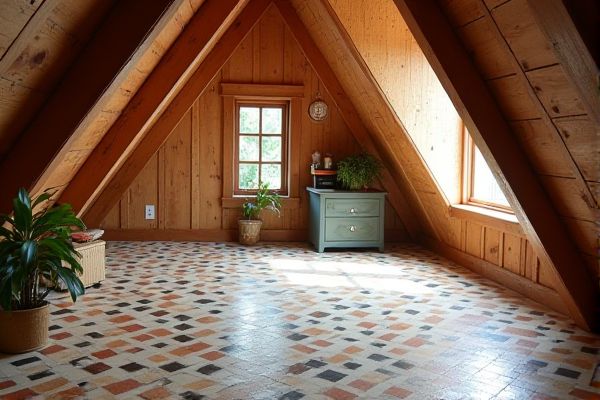
Attic mosaic tiles offer a unique, artistic aesthetic with durability and easy maintenance, making them ideal for decorative attic floors or walls, whereas vinyl tiles provide a budget-friendly, water-resistant option that is simpler to install and replace. Explore the rest of the article to discover which flooring choice best suits your attic renovation needs.
Table of Comparison
| Feature | Attic Mosaic Tile | Vinyl Tile (Attic) |
|---|---|---|
| Material | Glass, ceramic, or stone | Polyvinyl chloride (PVC) |
| Durability | Highly durable; resistant to scratches and moisture | Moderately durable; prone to dents and scratches |
| Installation | Labor-intensive; requires grout and precise placement | Easy DIY installation; peel-and-stick or click-lock |
| Weight | Heavy; may require attic structural reinforcement | Lightweight; suitable for attic floors without extra support |
| Cost | Higher initial cost; long-term value | Lower upfront cost; less durable lifespan |
| Maintenance | Easy to clean; resistant to stains | Requires regular cleaning; can fade or peel over time |
| Thermal Properties | Cold underfoot; poor insulation | Warmer and softer; better insulation for attic use |
| Water Resistance | Excellent water resistance | Good water resistance; vulnerable to water damage if seams are exposed |
Introduction: Attic Mosaic Tile vs Vinyl Tile
Attic mosaic tile offers a durable, water-resistant surface with intricate design options that enhance aesthetic appeal and increase property value. Vinyl tile provides a cost-effective, lightweight alternative with easier installation and excellent moisture resistance, ideal for DIY attic renovations. Your choice depends on balancing long-term durability and style preferences against budget and ease of installation.
Material Composition and Characteristics
Attic mosaic tile is typically composed of natural stone, glass, or ceramic, offering high durability, heat resistance, and a unique aesthetic with intricate patterns suited for decorative purposes. Vinyl tile in the attic is made from PVC composite, providing flexibility, moisture resistance, and easier installation with a softer, warmer feel underfoot. Your choice depends on whether you prioritize long-lasting material strength and artistic design or cost-effective, practical flooring with low maintenance.
Aesthetic Appeal in Attic Spaces
Attic mosaic tile offers a unique and intricate aesthetic appeal that enhances the charm and character of attic spaces, creating a visually striking focal point with vibrant colors and patterns. Vinyl tile provides a more uniform and versatile look, often mimicking natural materials while offering water resistance and easy maintenance. Your choice depends on whether you prioritize the artistic, decorative impact of mosaic tiles or the practical, adaptable style of vinyl tiles in your attic design.
Installation Process and Ease for Attics
Attic mosaic tile installation requires precise cutting and careful alignment due to its rigid, small individual pieces, which can be time-consuming and may need specialized tools. Vinyl tile for attics offers a simpler, faster installation with peel-and-stick or click-lock options that are lightweight and flexible, making it ideal for uneven or confined spaces. Your choice depends on balancing the durability and aesthetic appeal of mosaic tiles with the ease and convenience of vinyl tile installation in attic environments.
Durability and Longevity Considerations
Attic mosaic tiles, typically made from ceramic or glass, offer superior durability and resist scratches, moisture, and temperature fluctuations better than vinyl tiles, ensuring long-term performance in attic environments. Vinyl tiles, while more affordable and easier to install, tend to wear out faster under heavy foot traffic and may warp or discolor when exposed to heat or humidity. Choosing attic mosaic tiles enhances longevity and maintains aesthetic appeal, making them a more durable investment for attic flooring.
Insulation and Energy Efficiency in Attic Flooring
Attic mosaic tiles offer superior insulation properties due to their thicker composition and ability to retain heat, enhancing energy efficiency in attic flooring. Vinyl tiles, while easier to install and maintain, generally provide lower thermal resistance, which may result in higher energy costs for heating and cooling. Opting for mosaic tiles can contribute to improved attic temperature regulation and reduced energy consumption.
Maintenance and Cleaning Requirements
Attic mosaic tile offers durable, water-resistant surfaces that require only regular sweeping and occasional mopping with mild detergent to maintain its vibrant appearance. Vinyl tile in the attic is easy to clean, needing simple sweeping and damp mopping, but it may be more prone to scratches and dents compared to mosaic tile. Choosing mosaic tile can reduce long-term maintenance efforts, while vinyl tiles might suit your attic if you prefer lightweight, low-cost flooring with straightforward cleaning demands.
Cost Comparison: Mosaic Tile vs Vinyl Tile
Mosaic tile for an attic typically costs between $10 and $30 per square foot, reflecting its durability and intricate design options, while vinyl tile averages $2 to $7 per square foot, offering a budget-friendly alternative with easier installation. Mosaic tiles require professional installation due to their complexity, adding to the overall expense, whereas vinyl tiles are often DIY-friendly, reducing labor costs significantly. Long-term, mosaic tiles provide superior longevity and resistance to wear, potentially lowering replacement frequency compared to vinyl tiles, which may need more frequent upkeep in high-traffic attic spaces.
Moisture and Temperature Resistance
Attic mosaic tiles provide superior moisture and temperature resistance compared to vinyl tiles, making them more durable in fluctuating attic conditions. These mosaic tiles typically consist of ceramic or glass materials that withstand humidity and extreme temperatures without warping or degrading. Vinyl tiles, prone to expansion and contraction, may buckle or peel in attics with high moisture or temperature variations.
Best Choice for Attic Upgrades: Final Verdict
Attic mosaic tiles offer superior durability, moisture resistance, and aesthetic appeal compared to vinyl tiles, making them ideal for long-term attic upgrades. Vinyl tiles provide a budget-friendly and easy-to-install option but may lack the resilience and insulation properties required in attic environments. For maximizing attic comfort, durability, and style, mosaic tiles represent the best investment choice.
 homyna.com
homyna.com